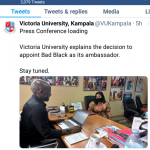Are we losing professional journalism practice in Uganda to social media and moonlighting?
It is increasingly becoming difficult to find journalists living up to their expectations in Uganda. Professional practice anywhere builds on serving the public using a substantial foundation of knowledge. Journalists continue to raise ethical concerns with their conduct on social media and taking on side jobs. Journalism principles will never change, but a lot continues to change with the environment in which journalism is practised.
Some Journalists engage in a variety of side activities, such as Master of ceremonies, Political engagements, Goodwill Ambassadorship, advertising, influence marketing, social media management, voice-over works, and public relations. Moonlighting cannot guarantee independence and impartiality in their journalism work. In May 2021, Citizen TV banned anchors from certain side hustles, citing reputation risks. The company in a statement prohibited its staff from advertising for any faith, alcohol products, political parties, and their candidates. Staff of Citizen TV must take part in restricted events and advertisements after seeking.
A journalist resigns to stand for a political office, and they lose. Their official social media accounts still have their campaign posts. Why would a Ugandan media house rush to admit them back to the newsroom? Can he/she prove they will not discriminate against others from another politician camp accessing the media?
Low pay and inadequate facilitation for most Ugandan journalists is a fact, a side business is justifiable. Yes, let a journalist run a social media account and become an influencer within boundaries. Low pay and does not mean they allow being on payrolls of news sources. How do you treat a source objectively that contributes to your wallet if you are their content creator, photographer, and MC?
Journalism is largely about responsibility and service to society. It is never about being guns for hire. Today, we are seeing news anchors and reporters appointed brand ambassadors for NGOs and other products. Even if the NGO appointment is purely not voluntary, he/she will likely treat that topic differently when it is in news.
In Uganda, We have had not had journalists fired due to their unprofessional social media content yet Social media conduct on a personal journalist’s accounts continues to pose ethical and trusted news source questions. Abandoning rules of engagement to chase clout is on the rise. Some rush to benefit from Social media happening now faze with less fact-checking. Other journalists are tempted to post anything even if they know it is not accurate, just to hit the desired engagement numbers.
The social media conduct of journalists must be an interest of their employers, public, and media regulators. A journalist is always called out for fake news on Twitter, but the cycle continues with no apology. Yes, some put a disclaimer about views being their own, but it solves nothing. People will always link their posts to their workplace operations. The shouting social media tone in a way affects their professionalism and credibility portrayal.
Some news anchors with no journalism training background seem to have failed to draw online content boundaries. If a journalist is always attacking or praising a political party on social media, why will their media house not be accused of bias? You cannot be a suspected “gun for hire” on your social media, and people expect your media house to be independent.
The public will rely on journalists to objectively interpret news, not influence interpretation. A news anchor does press-ups during prime news just to get online attention and critics talking. Would you expect the audience to take the news seriously? Another journalist trends online for hours just because they have refused to admit and correct a mistake. You find an active journalist posting rants, complaints, and private meeting pictures with politicians that are likely to drive public opinion. What will be the conclusion on their independence?
Social media conduct for media officials should include how a journalist’s bio is written because it affects perceptions. Do you have to put your religious and political affiliations?
Every stakeholder should play their part. Media owners have a role too: set boundaries on side gigs for their staff; have an internal conflict of interest checking system; develop the capacity of the inexperienced journalists with no formal training with refresher ethics classes; and be strict and publicly punish whoever crosses the line. Do you want to be identified as a feminist? BBC has social media guidelines that tell employees not to ‘share personal opinion on matters of public policy and controversial subjects’ on online Internally, an editor should assign a person a topic they will not be based on. The welfare of journalists should be improved to stop them from thinking about side gigs. Journalist should avoid some personal thoughts. You could be genuinely objectively, but your social media rants are taken to mean political bias.
Ivan N Baliboola
PR & Organisational Diagnosis specialist
This post was created with our nice and easy submission form. Create your post!





